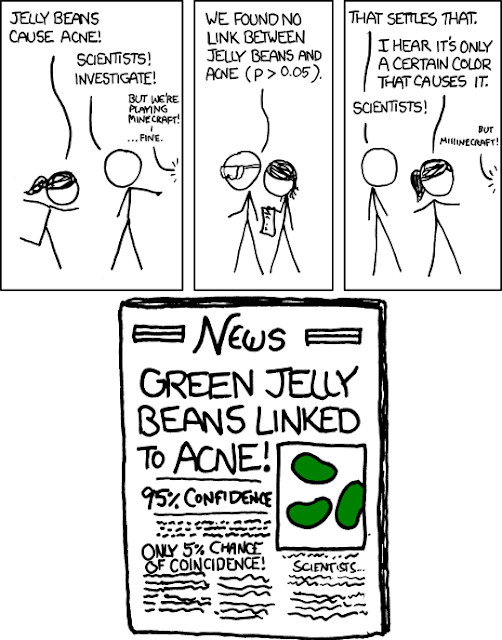 |
| (Click here for full comic on xkcd) |
How often have we believed “facts”
presented in peer-reviewed papers without questioning the methods or
statistical analyses – simply trusting that the researchers were honest, that no good or self-respecting scientist would fabricate
data, and those who did would ultimately be found out and dealt with? Until I started doing full-time research, I wasn't aware that papers could be retracted – and for seemingly minor reasons, such as technical errors (papers are actually retracted quite often; there’s even a
website that tracks them!).
It wasn’t until the STAP cell fiasco last year that I started to seriously (and sadly and angrily, all at the same
time) consider the reality of data fabrication and the consequences that a retraction
as spectacular as that one had on the scientific community as well as the
public, who trust scientists to perform research not only with innovation and
accuracy, but also honesty and integrity.
Two befuddling questions I had were: How do fabricated results evade the
scrutiny of the most knowledgeable scientists in the field during the
peer-review process and, what pushed scientists to put their careers at stake
and publish fraudulent data?
Several of the assigned articles strongly reflected and addressed my views on the flaws of the peer-review process, the
pressures of being a researcher, and the inherent fallibility of
human nature and judgment. And I feel that the way funding is awarded plays one of the biggest roles in exacerbating these things.
Research funding is more competitive than ever. With
that competitiveness comes the increased pressure to publish more and publish
faster (Read: Peter Higgs: I wouldn’t be productive enough for today’s academic system). Standard criteria for grants defined by the NIH include (grouped based on my own observations): your proposal (significance, innovation, approach), your institution (environment), and yourself (investigators and overall impact). When credibility and merit are met with the stress of vying for limited resources that could determine someone's future and career, it is no wonder that data fraud occurs.
I feel that before we can move forward from the anxiety of
accepting scientific data at face value, the thing that needs
to change is that scientists have to value integrity and reliability of unbiased results. In a society and
scientific environment where quantity seemingly takes precedence over quality,
the pressure to produce copious amounts of papers and data can be crippling in furthering scientific knowledge and decreasing public skepticism of “breakthroughs”
and “high impact research.” I wonder: can statistics really overcome human nature's fallibility
and bias in the face of personal interest?
No comments:
Post a Comment